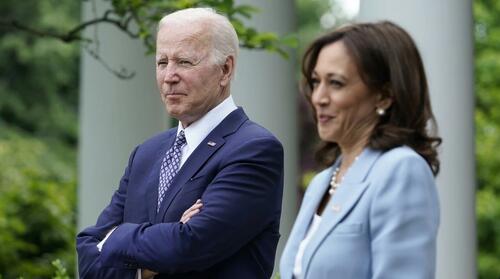
Authored by Philip Wegmann via RealClear Politics (emphasis ours),
It was her first overseas trip, and Vice President Harris, recently deputized to address what the White House calls “the root causes of migration,” was in Guatemala trying to break through with a simple message. “Do not come,” Harris told would-be migrants last June. “Do not come. The United States will continue to enforce our laws and secure our borders.”

They did not listen, or if any migrants did hear Harris last year, many ignored her message. Just last month, according to U.S. Customs and Border Patrol, 234,088 migrants were apprehended at the southern border, the highest mark ever recorded.
Asked that same month if President Biden had confidence in Harris and her ability to handle the situation, then-White House Press Secretary Jen Psaki replied, “he absolutely does.” But as the flow of migrants accelerates across the southern border, immigration has disappeared from the vice president’s public schedule.
A compilation of that schedule by the Los Angeles Times, reviewed by RealClearPolitics, shows that Harris has not hosted an immigration-specific event since last summer. The last one, a meeting with Asian American, Native Hawaiian, and Pacific Islander leaders in the White House last August, touched briefly on immigration.
White House officials dispute any characterization that Harris’ public schedule tells the whole story. “The vice president continues to lead implementation of the Root Causes Strategy and has been engaging with Cabinet and other Administration officials on this effort,” Harris’ Press Secretary Kirsten Allen told RCP.
Addressing the challenge remains part of the vice president’s policy portfolio. She leads top-level meetings that are not always made public, and she has taken point in diplomatic efforts in the region. For instance, it was Harris who traveled to Honduras for the inauguration of President Xiomara Castro in January. Administration officials hoped to find a new ally in that executive, someone who would help stem the flow of the millions of people heading north through Central America to the southern border. According to an official White House readout, Harris and Castro discussed “a broad range of issues.” Among them migration, but also coronavirus and the economy as well as corruption and gender-based violence.
Despite those efforts, the influx has not slowed, and Biden is expected to end enforcement of Title 42, the pandemic policy that allowed Border Patrol to turn away hundreds of thousands of migrants on public health grounds. Warnings from some Democrats in border states, including Texas Rep. Henry Cuellar, have gone unheeded.
The Department of Homeland Security is bracing for more record-breaking numbers at the border, and NBC News reports that there is concern in the department that they won’t have enough funding to address a surge if Title 42 is lifted, compounding a challenge that Biden has faced since the beginning of his presidency.
As the number of interdictions started to rise and chaotic images from the southern border flooded cable news, concern grew, even among Democrats. Biden’s own pollsters, the New York Times reported, warned that the issue was “a growing vulnerability." Biden still insisted that he could get the situation under control, albeit with divine intervention.
“Is there a crisis at the border?” RCP asked the president as he walked out of the East Room of the White House after a speech last March.
“No,” Biden replied over his shoulder. “We’ll be able to handle it,” he said while walking side-by-side with Harris. “God willing.”
Two weeks later, the Associated Press reported at the time, Biden tapped Harris to lead the administration efforts to tackle the migration challenge at the southern border and work with Central American nations to address root causes of the problem. Republicans were eager to assign blame and dubbed Harris “border czar.”
The vice president rejected that framing and sought to clarify her mission. As the White House press secretary explained to reporters last March, Harris “will be helping lead that effort, specifically the root causes – not the border,” admitting that there has been “some confusion over that.”
The president was also confused: When Biden and Harris met with the Congressional Black Caucus in April that year, he praised his vice president, saying she would do “a hell of a job” handling immigration, according to a new book by New York Times’ reporters Jonathan Martin and Alexander Burns. But Harris corrected him then and there, the two write. “Excuse me,” she said, “it's the Northern Triangle – not immigration.”
Biden eventually clarified the mission. “It’s not her full responsibility,” he later told reporters, but “when she speaks, she speaks for me.”
Whether she wanted the job or not, Harris embraced the challenge. She has made three trips to the region, and she traveled to the southern border to hear directly from Border Patrol. The vice president has met both with law enforcement and migrant groups, stressing all the while that the question “cannot be reduced to a political issue.”
Politics were there from the beginning though, and some feared that deputizing Harris to tackle such a mammoth challenge ran the risk of unfairly saddling her with a thankless mission for which there is no easy solution. “She is qualified to do the job,” Chuck Rocha told RCP of Biden’s decision to turn this part of his policy portfolio over to his vice president. Rocha helmed Latino outreach for Sen. Bernie Sanders in both of that candidate’s presidential bids, and Rocha credited Harris for being “a staunch advocate of the progressive wing of the immigration movement.”
All the same, Rocha warned last year that expectations should be tempered: “It has been an issue that we have been trying to fix for generations, one that I don’t think any one person can totally solve.”
Biden has called on Congress to take up comprehensive immigration reform since he got to the White House. There is no bipartisan appetite on Capitol Hill for the bill that he sent to Congress on his first day in office. The administration has subsequently been left to its own devices, and Harris released a 20-page plan last July to address the problem.
“We will build on what works, and we will pivot away from what does not work,” Harris wrote in an introduction to the plan that focuses on creating partnerships with Northern Triangle countries to combat corruption, violence, and poverty.
“It will not be easy, and progress will not be instantaneous,” the vice president warned, “but we are committed to getting it right.” Biden should know. He was deputized by then-President Obama to deal with a similar mission amid an earlier surge of migrants, many of them unaccompanied children. On a tour of Central and South American nations in 2014, he offered U.S. help to root out corruption, provide economic opportunity, and ensure safety in the Northern Triangle nations.
“We have to deal with the root causes,” Vice President Biden told reporters gathered for a press conference in the residence of the U.S. ambassador to Guatemala, echoing the exact phrase his administration now uses eight years later.
Biden understands the challenge, and that tackling it without help from Congress is arduous and thankless, if not impossible.
“I said when we became a team and got elected, that the vice president was going to be the last person in the room,” he joked last March when he announced that Harris would helm the mission. “She didn’t realize that means she gets every assignment.”
“I gave you a tough job, and you’re smiling, but there’s no one better capable of trying to organize this for us,” the president continued after the levity. The vice president didn’t flinch. She thanked him “for having confidence in me.” Then Harris added, “there’s no question that this is a challenging situation.”
Authored by Philip Wegmann via RealClear Politics (emphasis ours),
It was her first overseas trip, and Vice President Harris, recently deputized to address what the White House calls “the root causes of migration,” was in Guatemala trying to break through with a simple message. “Do not come,” Harris told would-be migrants last June. “Do not come. The United States will continue to enforce our laws and secure our borders.”

They did not listen, or if any migrants did hear Harris last year, many ignored her message. Just last month, according to U.S. Customs and Border Patrol, 234,088 migrants were apprehended at the southern border, the highest mark ever recorded.
Asked that same month if President Biden had confidence in Harris and her ability to handle the situation, then-White House Press Secretary Jen Psaki replied, “he absolutely does.” But as the flow of migrants accelerates across the southern border, immigration has disappeared from the vice president’s public schedule.
A compilation of that schedule by the Los Angeles Times, reviewed by RealClearPolitics, shows that Harris has not hosted an immigration-specific event since last summer. The last one, a meeting with Asian American, Native Hawaiian, and Pacific Islander leaders in the White House last August, touched briefly on immigration.
White House officials dispute any characterization that Harris’ public schedule tells the whole story. “The vice president continues to lead implementation of the Root Causes Strategy and has been engaging with Cabinet and other Administration officials on this effort,” Harris’ Press Secretary Kirsten Allen told RCP.
Addressing the challenge remains part of the vice president’s policy portfolio. She leads top-level meetings that are not always made public, and she has taken point in diplomatic efforts in the region. For instance, it was Harris who traveled to Honduras for the inauguration of President Xiomara Castro in January. Administration officials hoped to find a new ally in that executive, someone who would help stem the flow of the millions of people heading north through Central America to the southern border. According to an official White House readout, Harris and Castro discussed “a broad range of issues.” Among them migration, but also coronavirus and the economy as well as corruption and gender-based violence.
Despite those efforts, the influx has not slowed, and Biden is expected to end enforcement of Title 42, the pandemic policy that allowed Border Patrol to turn away hundreds of thousands of migrants on public health grounds. Warnings from some Democrats in border states, including Texas Rep. Henry Cuellar, have gone unheeded.
The Department of Homeland Security is bracing for more record-breaking numbers at the border, and NBC News reports that there is concern in the department that they won’t have enough funding to address a surge if Title 42 is lifted, compounding a challenge that Biden has faced since the beginning of his presidency.
As the number of interdictions started to rise and chaotic images from the southern border flooded cable news, concern grew, even among Democrats. Biden’s own pollsters, the New York Times reported, warned that the issue was “a growing vulnerability.” Biden still insisted that he could get the situation under control, albeit with divine intervention.
“Is there a crisis at the border?” RCP asked the president as he walked out of the East Room of the White House after a speech last March.
“No,” Biden replied over his shoulder. “We’ll be able to handle it,” he said while walking side-by-side with Harris. “God willing.”
Two weeks later, the Associated Press reported at the time, Biden tapped Harris to lead the administration efforts to tackle the migration challenge at the southern border and work with Central American nations to address root causes of the problem. Republicans were eager to assign blame and dubbed Harris “border czar.”
The vice president rejected that framing and sought to clarify her mission. As the White House press secretary explained to reporters last March, Harris “will be helping lead that effort, specifically the root causes – not the border,” admitting that there has been “some confusion over that.”
The president was also confused: When Biden and Harris met with the Congressional Black Caucus in April that year, he praised his vice president, saying she would do “a hell of a job” handling immigration, according to a new book by New York Times’ reporters Jonathan Martin and Alexander Burns. But Harris corrected him then and there, the two write. “Excuse me,” she said, “it’s the Northern Triangle – not immigration.”
Biden eventually clarified the mission. “It’s not her full responsibility,” he later told reporters, but “when she speaks, she speaks for me.”
Whether she wanted the job or not, Harris embraced the challenge. She has made three trips to the region, and she traveled to the southern border to hear directly from Border Patrol. The vice president has met both with law enforcement and migrant groups, stressing all the while that the question “cannot be reduced to a political issue.”
Politics were there from the beginning though, and some feared that deputizing Harris to tackle such a mammoth challenge ran the risk of unfairly saddling her with a thankless mission for which there is no easy solution. “She is qualified to do the job,” Chuck Rocha told RCP of Biden’s decision to turn this part of his policy portfolio over to his vice president. Rocha helmed Latino outreach for Sen. Bernie Sanders in both of that candidate’s presidential bids, and Rocha credited Harris for being “a staunch advocate of the progressive wing of the immigration movement.”
All the same, Rocha warned last year that expectations should be tempered: “It has been an issue that we have been trying to fix for generations, one that I don’t think any one person can totally solve.”
Biden has called on Congress to take up comprehensive immigration reform since he got to the White House. There is no bipartisan appetite on Capitol Hill for the bill that he sent to Congress on his first day in office. The administration has subsequently been left to its own devices, and Harris released a 20-page plan last July to address the problem.
“We will build on what works, and we will pivot away from what does not work,” Harris wrote in an introduction to the plan that focuses on creating partnerships with Northern Triangle countries to combat corruption, violence, and poverty.
“It will not be easy, and progress will not be instantaneous,” the vice president warned, “but we are committed to getting it right.” Biden should know. He was deputized by then-President Obama to deal with a similar mission amid an earlier surge of migrants, many of them unaccompanied children. On a tour of Central and South American nations in 2014, he offered U.S. help to root out corruption, provide economic opportunity, and ensure safety in the Northern Triangle nations.
“We have to deal with the root causes,” Vice President Biden told reporters gathered for a press conference in the residence of the U.S. ambassador to Guatemala, echoing the exact phrase his administration now uses eight years later.
Biden understands the challenge, and that tackling it without help from Congress is arduous and thankless, if not impossible.
“I said when we became a team and got elected, that the vice president was going to be the last person in the room,” he joked last March when he announced that Harris would helm the mission. “She didn’t realize that means she gets every assignment.”
“I gave you a tough job, and you’re smiling, but there’s no one better capable of trying to organize this for us,” the president continued after the levity. The vice president didn’t flinch. She thanked him “for having confidence in me.” Then Harris added, “there’s no question that this is a challenging situation.”







